Introduction
Artificial Intelligence (AI) is revolutionizing how organizations operate, offering unprecedented opportunities to enhance efficiency and productivity. However, transitioning from concept to full-scale implementation is fraught with challenges and risks. This article delves into the strategic importance of AI Proof of Concept (PoC) projects, illustrating their role in mitigating risks and providing scalable solutions.
It explores the critical steps in identifying the need for an AI PoC, highlights common challenges encountered, and shares real-life success stories of AI PoC implementations. Furthermore, it outlines best practices for building a robust AI PoC and discusses strategies for scaling these initiatives for full implementation. By understanding and leveraging these insights, organizations can unlock the potential of AI to drive significant improvements in their operations.
Benefits of AI PoC: Reducing Risks and Ensuring Scalability
Implementing an AI Proof of Concept (PoC) allows organizations to validate their AI initiatives on a small scale before committing significant resources. This method mitigates risks by providing insights into the feasibility and potential impact of the AI solution. For example, the engineering team of a company automated the extraction of key values from over 2,000 PDF documents, a task that was previously done manually and consumed significant time. The AI solution not only streamlined this process but also freed up employees to focus on more creative and meaningful work. This successful PoC demonstrated scalability as it was later applied to other business units for various purposes, showcasing how AI solutions can evolve and integrate seamlessly with existing systems. Additionally, leveraging a small-scale PoC helps in building the necessary skills within the team, which is essential for more complex AI projects. As AI initiatives grow, transitioning to more sophisticated skills becomes crucial, further enhancing operational efficiency and productivity.
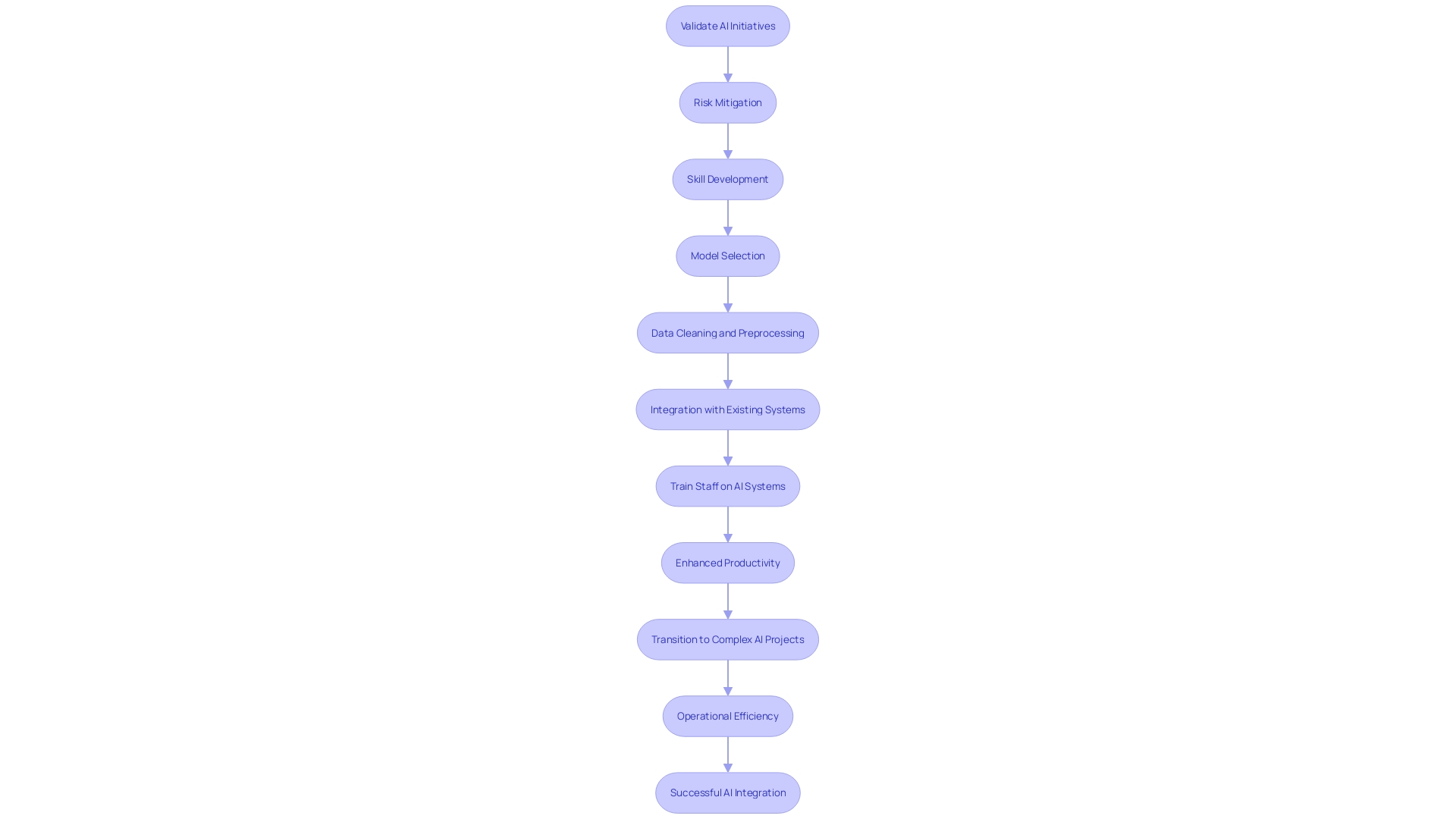
Identifying the Need for an AI PoC
Organizations aiming to implement AI Proof of Concepts (PoCs) must first conduct a thorough evaluation of their specific issues and strategic objectives. This involves a detailed analysis of existing processes to pinpoint inefficiencies and identify areas where AI can provide significant value. For instance, Microsoft’s AI Strategy Roadmap emphasizes the importance of understanding technology, business, and organizational perspectives to meet goals effectively.
Engaging stakeholders across various departments is crucial to this process, ensuring a comprehensive understanding of the operational landscape. This collaborative approach aligns the PoC with the overall strategic goals, increasing the likelihood of successful implementation. According to a survey conducted by Ipsos, the most predictive factor for AI success is clear communication between developers and business experts. This aids in expressing the business obstacles, desired outcomes, and success metrics accurately.
Additionally, addressing potential skill gaps is essential. Early AI initiatives often reveal bottlenecks, such as a disconnect between senior executives and employees or a lack of necessary training. Continuous learning and skill development, inspired by practices like DevOps, are vital. As AI initiatives grow more complex, acquiring or developing sophisticated skills becomes imperative.
For AI Pics, it’s also important to consider the ROI and potential challenges, as highlighted by OODA. High upfront costs and low initial returns can be deterrents. However, with a well-structured strategy, entities can mitigate these issues and steer towards positive outcomes. Evaluating the effectiveness of key interventions and maintaining robust, flexible strategies can help navigate the diverse pathways of AI development.
Ultimately, success with AI PoCs lies in a well-rounded approach that includes strategic planning, stakeholder engagement, continuous learning, and effective communication. By focusing on these areas, organizations can unlock sustainable value and drive significant improvements in operational efficiency.
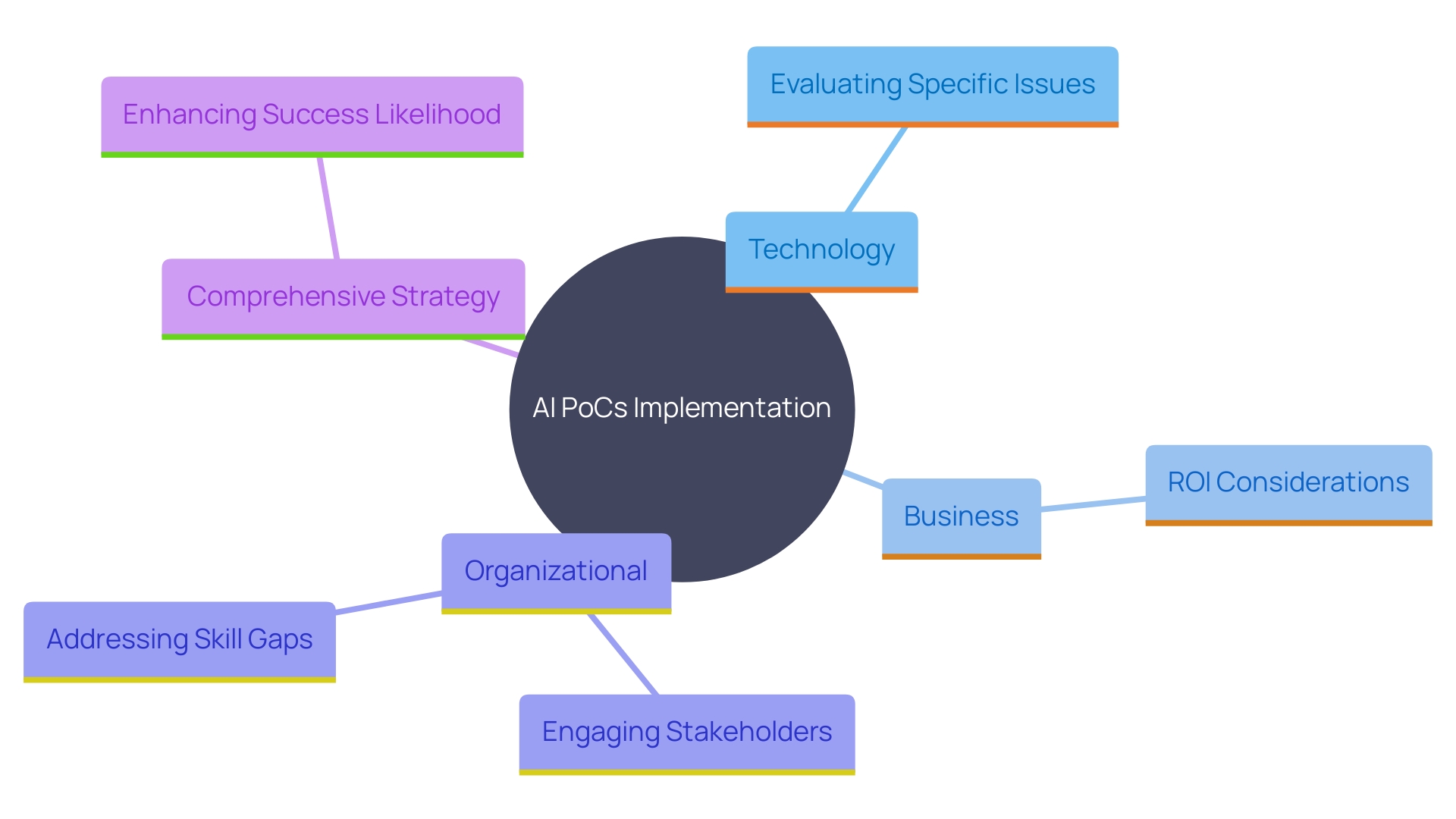
Common Challenges in AI PoC Projects
AI Proof of Concept (PoC) projects frequently encounter multiple obstacles, including data quality issues, lack of stakeholder buy-in, and integration complexities with existing systems. To overcome these challenges, it is crucial to establish clear communication channels among team members and stakeholders. Hosting knowledge-sharing meetings and workshops can facilitate these interactions, as demonstrated by the success of face-to-face and hybrid meetings, which ensured inclusivity for all team members, including clinicians with demanding schedules.
Moreover, comprehensive training is indispensable. For instance, the project team’s systematic method to product-specific training ensured that all users received the necessary guidance at the appropriate phase of deployment. This method not only enhanced user competence but also fostered a culture of innovation and collaboration. As highlighted by the University of Notre Dame Center for Research Computing, the adoption of data-centric and ethical methods is fundamental to building trust in AI systems, which is crucial for gaining stakeholder support.
Furthermore, addressing integration complexities requires a well-defined AI strategy that aligns with organizational structures and goals. This involves not just understanding the desired AI applications but also anticipating future data requirements and creating a dynamic data management approach. For instance, creating a structural ontology can offer a strong framework that evolves with the entity’s needs, ensuring continuity and adaptability in AI initiatives.
By leveraging these strategies—effective communication, thorough training, and strategic data management—organizations can navigate the challenges of AI PoC projects and pave the way for successful AI integration.
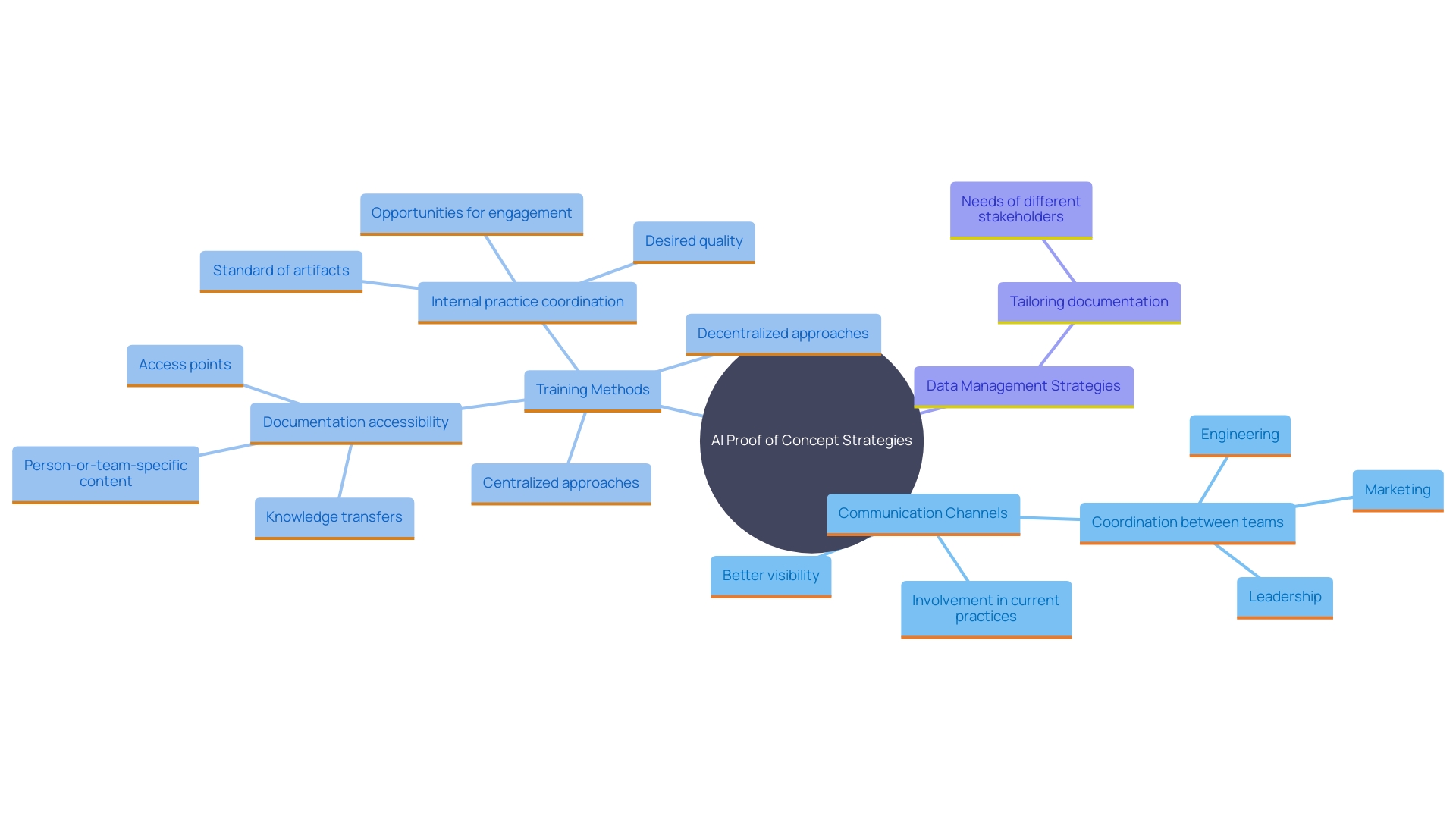
Success Stories: Real-Life Examples of AI PoC Implementation
Many entities have successfully implemented AI PoCs to drive significant improvements. For instance, a major retail brand utilized an AI PoC to optimize inventory management, resulting in a 20% reduction in excess stock. Similarly, Walles.Ai’s advanced fraud detection algorithms helped a leading financial institution significantly reduce fraudulent activities, protecting assets and enhancing customer trust. Additionally, a manufacturing company employed Walles.Ai’s smart manufacturing capabilities to monitor machine performance, identify bottlenecks, and streamline workflows, achieving notable increases in production efficiency and profitability. In healthcare, Walles.Ai’s predictive analytics enabled a healthcare organization to forecast patient admission rates, optimize resource allocation, and improve patient outcomes while reducing operational costs. These real-world success stories highlight the diverse applications and tangible benefits of AI solutions.
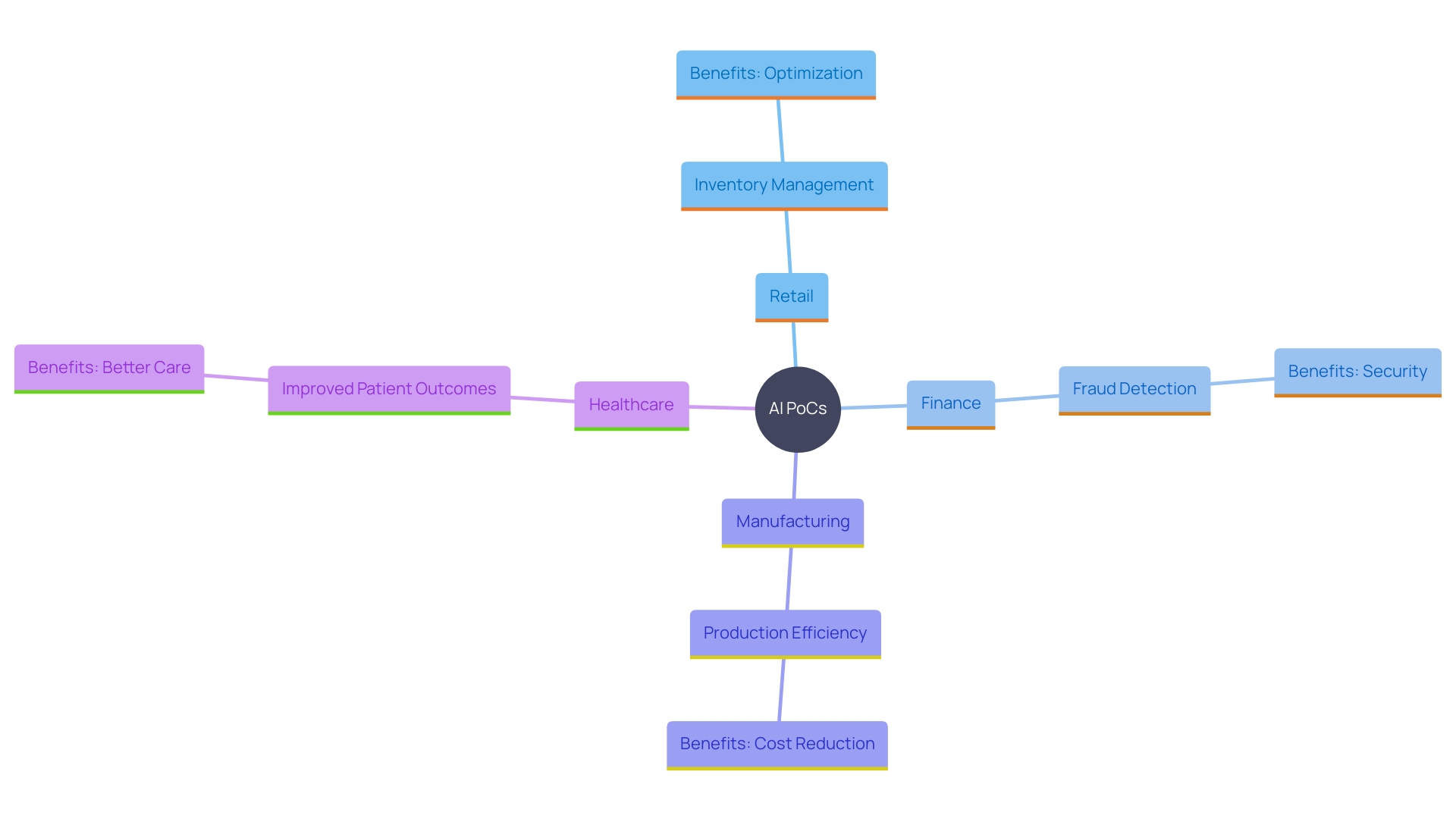
Best Practices for Building an AI PoC
Developing an effective AI Proof of Concept (PoC) requires a strategic approach that begins with clearly defined objectives and the right evaluation metrics. Setting these objectives guarantees that the PoC is in accordance with your overall business strategy and tackles the pertinent issues. Furthermore, data quality is paramount; the data used must be accurate, complete, and representative of the target audience or business objectives. This alignment makes it possible to draw meaningful insights and measure success effectively.
Collaboration with cross-functional teams plays a crucial role in enhancing the relevance and impact of the PoC. Subject matter experts (SMEs) bring essential knowledge for curating and preparing datasets that reflect specific challenges and scenarios. By providing SMEs with intuitive data annotation tools and efficient data management systems, entities can ensure that datasets are accurate and comprehensive, laying a solid foundation for AI/ML applications.
Additionally, adopting a repetitive method is vital. This method leverages principles from agile development, focusing on continuous learning and incremental improvements. The iterative process allows for ongoing refinement based on feedback and performance metrics, fostering continuous improvement. As Eric Boyd, Corporate Vice President of Azure AI Platform, notes, “The most successful organizations tend to have a mindset of experimentation and learning so they can see what’s working and systematically tackle any issues that arise.”
Incorporating structured, repeatable processes such as A/B testing can further enhance the PoC’s effectiveness. This approach compares different versions of AI models or user interfaces to determine which performs better, thereby optimizing outcomes. By focusing on iterative development and continuous learning, organizations can better anticipate and address potential barriers to implementation and success, ultimately driving more significant business value from AI initiatives.
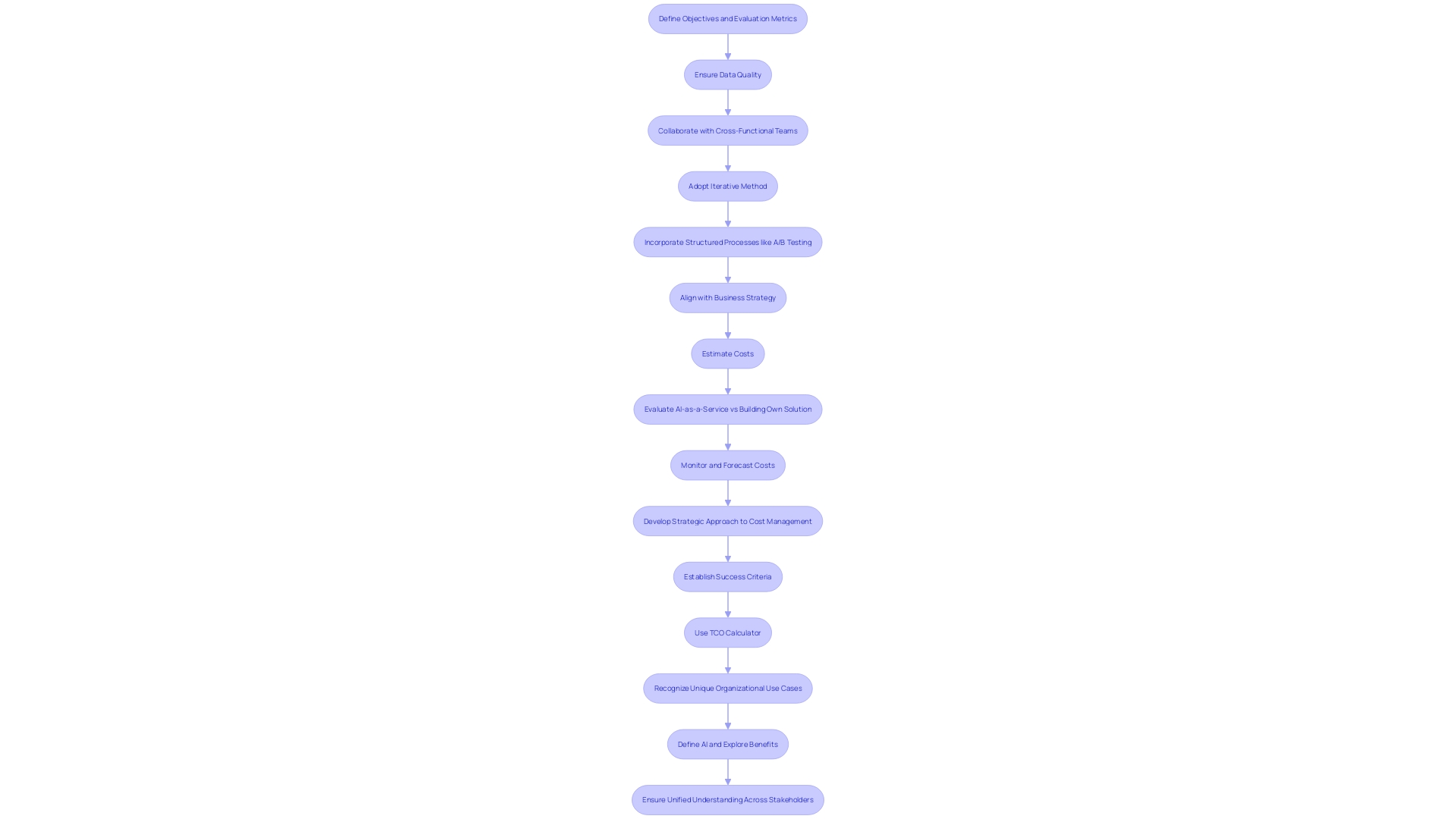
Scaling AI PoC for Full Implementation
Achieving successful AI Proof of Concept (PoC) is only the beginning; scaling it for comprehensive implementation demands meticulous planning. Organizations must thoroughly evaluate their infrastructure needs, develop a detailed rollout strategy, and actively involve additional stakeholders to ensure alignment and support. For instance, the Customer Service Engine (CSE) case study demonstrated the critical role of engaging various departments to handle complex customer service cases effectively. By creating feedback loops between human agents and the AI system, the CSE could continuously learn and improve, achieving a 90% resolution rate within six weeks.
Ongoing observation and assessment throughout the scaling stage are essential to tackle unexpected issues and enhance return on investment. Real-time monitoring and activity logging, as outlined in recent AI visibility measures, are essential to maintain oversight and enhance transparency. This ensures the deployment remains adaptive and responsive to evolving needs.
Moreover, interdisciplinary approaches are crucial to maintain reliable and sustainable AI infrastructure, as emphasized in recent studies. Integrating insights from different fields helps tackle challenges and build robust systems capable of long-term success. According to the latest statistics, although 90% of surveyed companies are investing in AI, only 54% have solutions in production, highlighting the importance of thorough planning and stakeholder engagement to bridge the gap between experimentation and real-world application.
Incorporating expert insights, such as those from OODA’s international team, can further support strategic planning and risk management, ensuring AI initiatives are not only effectively scaled but also sustainable and aligned with organizational goals.
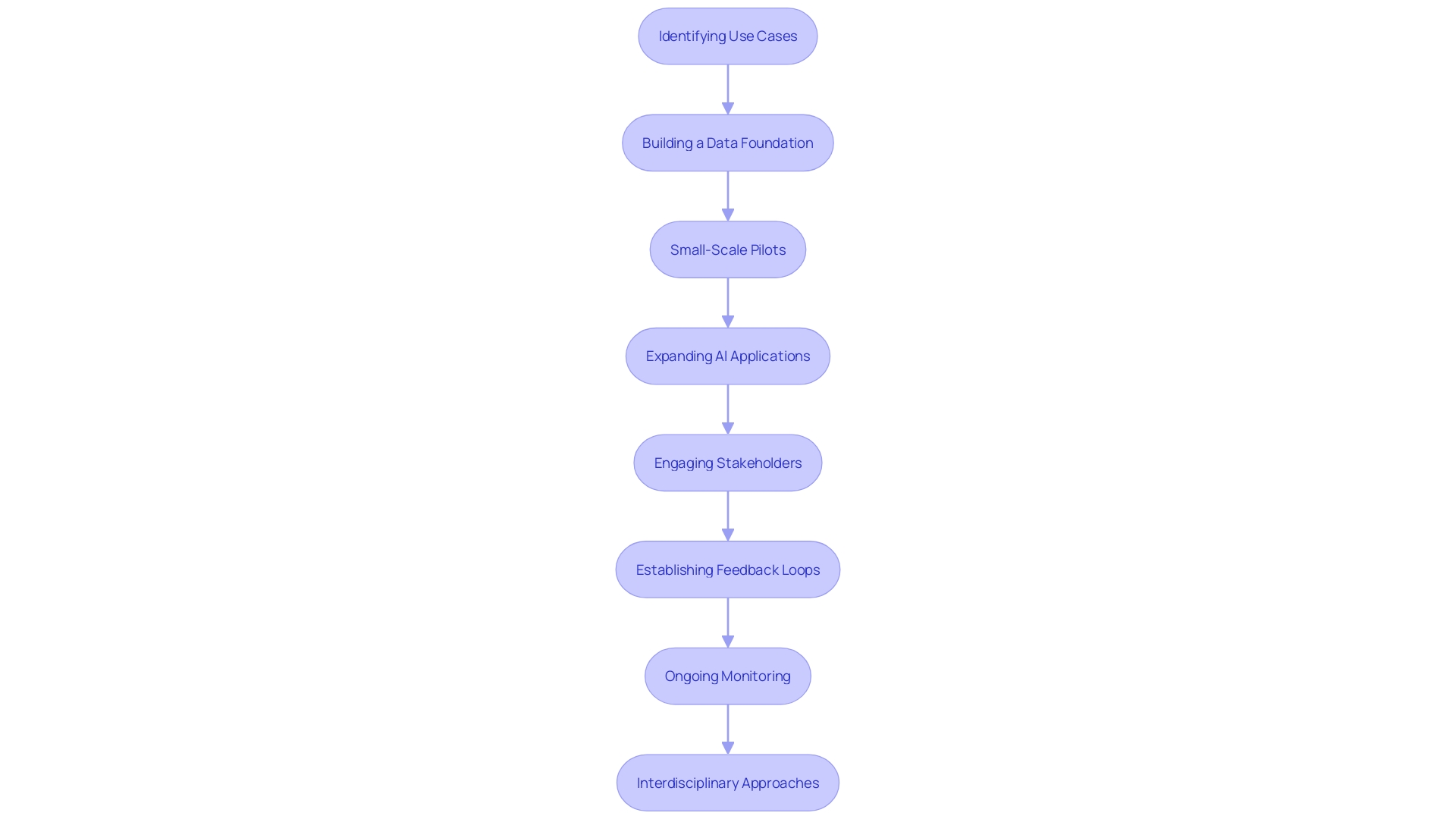
Conclusion
Implementing AI Proof of Concept (PoC) projects is a strategic way for organizations to validate AI initiatives while minimizing risks. These small-scale implementations allow for assessing feasibility and impact, as demonstrated by numerous success stories that showcase enhanced productivity and streamlined operations. Initial projects build team capabilities, preparing them for more complex AI applications that can drive long-term efficiency improvements.
Identifying the need for an AI PoC involves a thorough evaluation of existing processes and stakeholder engagement. Clear communication and collaboration across departments are essential for aligning PoC efforts with strategic objectives, while addressing skill gaps and fostering continuous learning are crucial for overcoming initial challenges.
To navigate common obstacles in AI PoC projects, organizations should focus on effective communication, comprehensive training, and strategic data management. Creating a collaborative environment and utilizing iterative development practices help tackle integration complexities and build trust in AI systems, ensuring successful and sustainable outcomes.
Scaling an AI PoC for full implementation requires meticulous planning and active stakeholder involvement. Continuous monitoring and evaluation, along with interdisciplinary insights, are vital for optimizing initiatives and ensuring alignment with organizational goals. By adopting a strategic approach to AI PoC projects, organizations can harness the transformative potential of AI, leading to significant operational improvements and sustainable competitive advantages.

